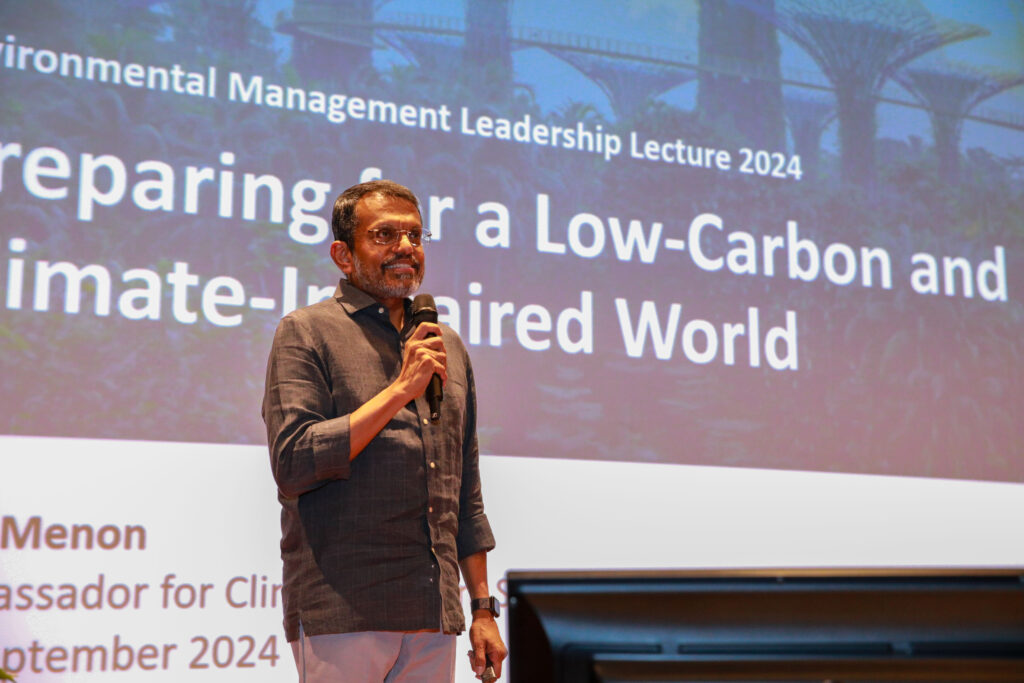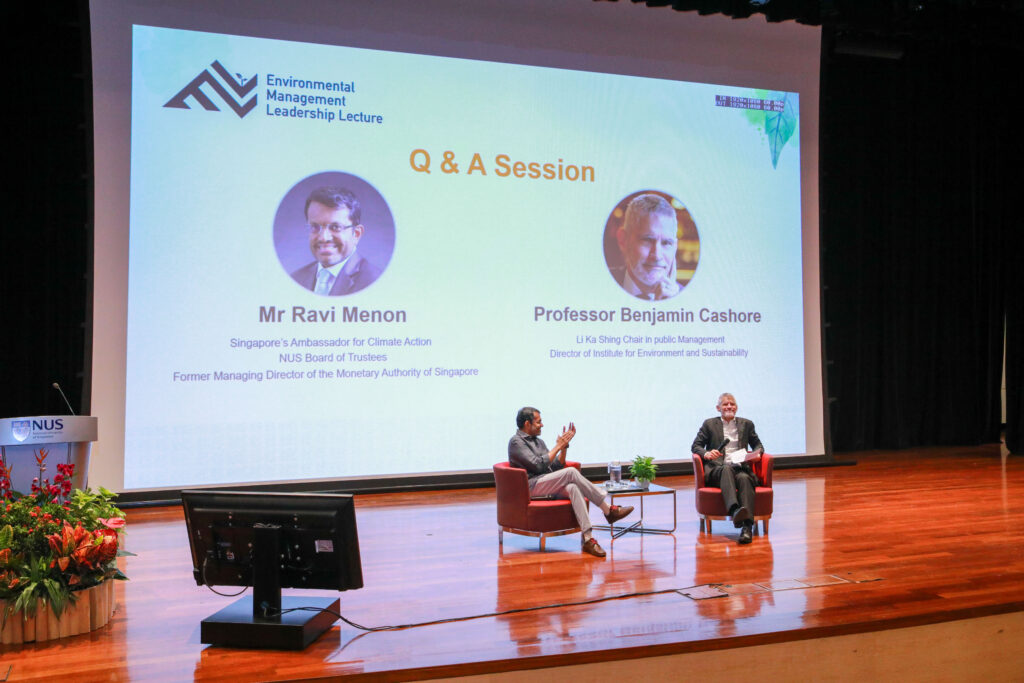Positioning Singapore for a low-carbon and climate-impaired world: Ravi Menon, Singapore’s first climate action ambassador
October 29, 2024
IN BRIEF | 10 min read
- Although the world is falling short of its climate goals, Mr Menon believes that Singapore is well placed to drive national and regional decarbonisation efforts.

Singapore is prepared to facilitate Asia’s transition to a low-carbon future. But Singapore cannot do this alone, it will work with like-minded partners. This was a point underscored by Mr Ravi Menon (NUS Economics ‘87), Singapore’s first Ambassador for Climate Action and member of NUS Board of Trustees, at the inaugural NUS Environmental Management Leadership Lecture (EMLL), on 14 September 2024.
Highlighting the urgency of preparing for a climate-impaired world, Mr Menon noted that climate-related disasters in 2022 affected over 52 million people and led to US$36 billion worth of damages.
At the same time, decarbonisation efforts are also on the rise in many countries.
“Global momentum on climate action is picking up because people are beginning to see what is happening,” he added, emphasising that the world will continue to face the dual realities of being climate-impaired while striving for low carbon emissions.
Mr Menon addressed over 150 NUS students, alumni, staff and industry partners at the lecture titled “Preparing for a Low-Carbon and Climate-Impaired World” which kickstarted the Highlight edition of this year’s NUS Sustainability CONNECT. He is also Chairman of the Glasgow Financial Alliance for Net Zero (GFANZ) Asia-Pacific Advisory Board and a member of the GFANZ Principals Group.
Organised by the NUS School of Continuing and Lifelong Education under the Master of Science (Environmental Management) programme, the annual EMLL series aims to facilitate interdisciplinary discussion about key issues and new developments in environmental management. Themed “Transformative Leadership in Climate Action: Navigating Challenges, Harnessing Innovation”, the series explores the role of transformative leadership as the driving force behind successful environmental management efforts, providing insights on how visionary and innovative leaders overcome obstacles and leverage new technologies to create a sustainable future.
Singapore’s triple transition to thrive in a low-carbon world
Singapore aims to achieve its long-term net-zero emissions aspiration by 2050, with intermediate targets across sectors as outlined in the Singapore Green Plan 2030. Referring to the changes as “complex and not easy, but necessary”, Mr Menon highlighted that the first change is a carbon transition which involves reducing our primary emissions to net-zero across sectors including industry, transport, and households.
Next is the energy transition which entails progressively decarbonising Singapore’s electricity grid while ensuring that it remains resilient. This requires striking a balance across energy security, affordability and sustainability. While Singapore’s unique geographical constraints make it difficult to harness certain forms of renewable energy, the nation can tap on the “four switches” to progressively decarbonise the grid – namely natural gas, solar, electricity imports from regional power grids, and low-carbon alternatives.
Mr Menon also noted that nuclear energy is another energy source the government has been looking at. However, he cautioned that there must first be public acceptance and adequate safety measures.
Lastly, an economic transition will also be necessary. He urged participants to “grow the green and green the brown”, referring to how Singapore must grasp green growth opportunities, transform carbon-intensive sectors, and turn being low-carbon into a competitive advantage.
To prepare for a climate-impaired world, Singapore must not only strive to reduce our emissions but also adapt to the direct impacts of climate change and its potential knock-on effects. Singapore has started implementing various measures to strengthen coastal protection, flood resilience, heat resilience, and food security. The government is also conducting in-depth studies to plan ahead and develop solutions in these areas.
“It will take a whole-of-nation effort,” he said. Significant scientific and technological advances will be necessary – which is where universities and academics can contribute – but individuals and communities must do their part too, he added.
Leading the way in transiting to a low-carbon future
Climate action must go beyond our borders, noted Mr Menon, with a nod to the ASEAN Power Grid initiative that is currently underway.
Having a system of cross-border power connections will allow renewable energy from typically remote generation sites to reach population centres across the region. This will spur decarbonisation in the region and enable the free trade of clean energy.
The city state can also drive green efforts in the region through blended finance, where governments invest in climate projects to reduce risk and make it easier for private entities to invest. Under the Financing Asia’s Transition Partnerships initiative, Singapore aims to raise US$5 billion with international partners to finance the effort to decarbonise the region.

The lecture was capped by an engaging Question-and-Answer segment that was facilitated by Professor Benjamin Cashore, Li Ka Shing Professor in Public Management and Director at the Institute for Environment and Sustainability.
During the segment, Mr Menon fielded questions about green finance and the need for a just transition in Asia, where countries should not have to forgo development for the sake of decarbonisation.
Noting that climate change is a “classic problem of collective failure”, he emphasised the need for collaboration to resolve the issue.
“There isn’t going to be one global leader that will solve the climate problem. We should look at where we can seize leadership at various levels,” he said. One way to exercise leadership in science and technology is by pivoting resources and capabilities towards developing climate solutions. In finance, financial institutions can exercise leadership through working with clients and customers to channel finances to activities that reduce emissions.
While strong government support is needed, it is only possible if it is supported by the rest of society. Community efforts and collective individual actions can signal demand for greener products and support for decarbonisation. “No one acting alone can solve the problem…we need collective action,” he concluded.
This story first appeared on NUSnews on 29 October 2024.

